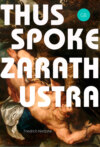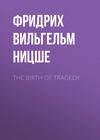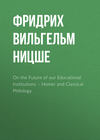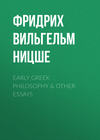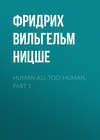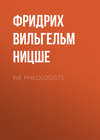Read the book: «Thus Spake Zarathustra», page 7
2
Here paused Zarathustra awhile, and looked lovingly on his disciples. Then he continued to speak thus – and his voice had changed:
Remain true to the earth, my brethren, with the power of your virtue! Let your bestowing love and your knowledge be devoted to be the meaning of the earth! Thus do I pray and conjure you.
Let it not fly away from the earthly and beat against eternal walls with its wings! Ah, there hath always been so much flown-away virtue!
Lead, like me, the flown-away virtue back to the earth – yea, back to body and life: that it may give to the earth its meaning, a human meaning!
A hundred times hitherto hath spirit as well as virtue flown away and blundered. Alas! in our body dwelleth still all this delusion and blundering: body and will hath it there become.
A hundred times hitherto hath spirit as well as virtue attempted and erred. Yea, an attempt hath man been. Alas, much ignorance and error hath become embodied in us!
Not only the rationality of millenniums – also their madness, breaketh out in us. Dangerous is it to be an heir.
Still fight we step by step with the giant Chance, and over all mankind hath hitherto ruled nonsense, the lack-of-sense.
Let your spirit and your virtue be devoted to the sense of the earth, my brethren: let the value of everything be determined anew by you! Therefore shall ye be fighters! Therefore shall ye be creators!
Intelligently doth the body purify itself; attempting with intelligence it exalteth itself; to the discerners all impulses sanctify themselves; to the exalted the soul becometh joyful.
Physician, heal thyself: then wilt thou also heal thy patient. Let it be his best cure to see with his eyes him who maketh himself whole.
A thousand paths are there which have never yet been trodden; a thousand salubrities and hidden islands of life. Unexhausted and undiscovered is still man and man’s world.
Awake and hearken, ye lonesome ones! From the future come winds with stealthy pinions, and to fine ears good tidings are proclaimed.
Ye lonesome ones of to-day, ye seceding ones, ye shall one day be a people: out of you who have chosen yourselves, shall a chosen people arise: – and out of it the Superman.
Verily, a place of healing shall the earth become! And already is a new odour diffused around it, a salvation-bringing odour – and a new hope!
3
When Zarathustra had spoken these words, he paused, like one who had not said his last word; and long did he balance the staff doubtfully in his hand. At last he spake thus – and his voice had changed:
I now go alone, my disciples! Ye also now go away, and alone! So will I have it.
Verily, I advise you: depart from me, and guard yourselves against Zarathustra! And better still: be ashamed of him! Perhaps he hath deceived you.
The man of knowledge must be able not only to love his enemies, but also to hate his friends.
One requiteth a teacher badly if one remain merely a scholar. And why will ye not pluck at my wreath?
Ye venerate me; but what if your veneration should some day collapse? Take heed lest a statue crush you!
Ye say, ye believe in Zarathustra? But of what account is Zarathustra! Ye are my believers: but of what account are all believers!
Ye had not yet sought yourselves: then did ye find me. So do all believers; therefore all belief is of so little account.
Now do I bid you lose me and find yourselves; and only when ye have all denied me, will I return unto you.
Verily, with other eyes, my brethren, shall I then seek my lost ones; with another love shall I then love you.
And once again shall ye have become friends unto me, and children of one hope: then will I be with you for the third time, to celebrate the great noontide with you.
And it is the great noontide, when man is in the middle of his course between animal and Superman, and celebrateth his advance to the evening as his highest hope: for it is the advance to a new morning.
At such time will the down-goer bless himself, that he should be an over-goer; and the sun of his knowledge will be at noontide.
“DEAD ARE ALL THE GODS: NOW DO WE DESIRE THE SUPERMAN TO LIVE.” – Let this be our final will at the great noontide! —
Thus spake Zarathustra.
THUS SPAKE ZARATHUSTRA. SECOND PART
“ – and only when ye have all denied me, will I return unto you
Verily, with other eyes, my brethren, shall I then seek my lost ones; with another love shall I then love you.” – ZARATHUSTRA, I., “The Bestowing Virtue.”
XXIII. THE CHILD WITH THE MIRROR
After this Zarathustra returned again into the mountains to the solitude of his cave, and withdrew himself from men, waiting like a sower who hath scattered his seed. His soul, however, became impatient and full of longing for those whom he loved: because he had still much to give them. For this is hardest of all: to close the open hand out of love, and keep modest as a giver.
Thus passed with the lonesome one months and years; his wisdom meanwhile increased, and caused him pain by its abundance.
One morning, however, he awoke ere the rosy dawn, and having meditated long on his couch, at last spake thus to his heart:
Why did I startle in my dream, so that I awoke? Did not a child come to me, carrying a mirror?
“O Zarathustra” – said the child unto me – “look at thyself in the mirror!”
But when I looked into the mirror, I shrieked, and my heart throbbed: for not myself did I see therein, but a devil’s grimace and derision.
Verily, all too well do I understand the dream’s portent and monition: my DOCTRINE is in danger; tares want to be called wheat!
Mine enemies have grown powerful and have disfigured the likeness of my doctrine, so that my dearest ones have to blush for the gifts that I gave them.
Lost are my friends; the hour hath come for me to seek my lost ones! —
With these words Zarathustra started up, not however like a person in anguish seeking relief, but rather like a seer and a singer whom the spirit inspireth. With amazement did his eagle and serpent gaze upon him: for a coming bliss overspread his countenance like the rosy dawn.
What hath happened unto me, mine animals? – said Zarathustra. Am I not transformed? Hath not bliss come unto me like a whirlwind?
Foolish is my happiness, and foolish things will it speak: it is still too young – so have patience with it!
Wounded am I by my happiness: all sufferers shall be physicians unto me!
To my friends can I again go down, and also to mine enemies! Zarathustra can again speak and bestow, and show his best love to his loved ones!
My impatient love overfloweth in streams, – down towards sunrise and sunset. Out of silent mountains and storms of affliction, rusheth my soul into the valleys.
Too long have I longed and looked into the distance. Too long hath solitude possessed me: thus have I unlearned to keep silence.
Utterance have I become altogether, and the brawling of a brook from high rocks: downward into the valleys will I hurl my speech.
And let the stream of my love sweep into unfrequented channels! How should a stream not finally find its way to the sea!
Forsooth, there is a lake in me, sequestered and self-sufficing; but the stream of my love beareth this along with it, down – to the sea!
New paths do I tread, a new speech cometh unto me; tired have I become – like all creators – of the old tongues. No longer will my spirit walk on worn-out soles.
Too slowly runneth all speaking for me: – into thy chariot, O storm, do I leap! And even thee will I whip with my spite!
Like a cry and an huzza will I traverse wide seas, till I find the Happy Isles where my friends sojourn; —
And mine enemies amongst them! How I now love every one unto whom I may but speak! Even mine enemies pertain to my bliss.
And when I want to mount my wildest horse, then doth my spear always help me up best: it is my foot’s ever ready servant: —
The spear which I hurl at mine enemies! How grateful am I to mine enemies that I may at last hurl it!
Too great hath been the tension of my cloud: ‘twixt laughters of lightnings will I cast hail-showers into the depths.
Violently will my breast then heave; violently will it blow its storm over the mountains: thus cometh its assuagement.
Verily, like a storm cometh my happiness, and my freedom! But mine enemies shall think that THE EVIL ONE roareth over their heads.
Yea, ye also, my friends, will be alarmed by my wild wisdom; and perhaps ye will flee therefrom, along with mine enemies.
Ah, that I knew how to lure you back with shepherds’ flutes! Ah, that my lioness wisdom would learn to roar softly! And much have we already learned with one another!
My wild wisdom became pregnant on the lonesome mountains; on the rough stones did she bear the youngest of her young.
Now runneth she foolishly in the arid wilderness, and seeketh and seeketh the soft sward – mine old, wild wisdom!
On the soft sward of your hearts, my friends! – on your love, would she fain couch her dearest one! —
Thus spake Zarathustra.
XXIV. IN THE HAPPY ISLES
The figs fall from the trees, they are good and sweet; and in falling the red skins of them break. A north wind am I to ripe figs.
Thus, like figs, do these doctrines fall for you, my friends: imbibe now their juice and their sweet substance! It is autumn all around, and clear sky, and afternoon.
Lo, what fullness is around us! And out of the midst of superabundance, it is delightful to look out upon distant seas.
Once did people say God, when they looked out upon distant seas; now, however, have I taught you to say, Superman.
God is a conjecture: but I do not wish your conjecturing to reach beyond your creating will.
Could ye CREATE a God? – Then, I pray you, be silent about all Gods! But ye could well create the Superman.
Not perhaps ye yourselves, my brethren! But into fathers and forefathers of the Superman could ye transform yourselves: and let that be your best creating! —
God is a conjecture: but I should like your conjecturing restricted to the conceivable.
Could ye CONCEIVE a God? – But let this mean Will to Truth unto you, that everything be transformed into the humanly conceivable, the humanly visible, the humanly sensible! Your own discernment shall ye follow out to the end!
And what ye have called the world shall but be created by you: your reason, your likeness, your will, your love, shall it itself become! And verily, for your bliss, ye discerning ones!
And how would ye endure life without that hope, ye discerning ones? Neither in the inconceivable could ye have been born, nor in the irrational.
But that I may reveal my heart entirely unto you, my friends: IF there were gods, how could I endure it to be no God! THEREFORE there are no Gods.
Yea, I have drawn the conclusion; now, however, doth it draw me. —
God is a conjecture: but who could drink all the bitterness of this conjecture without dying? Shall his faith be taken from the creating one, and from the eagle his flights into eagle-heights?
God is a thought – it maketh all the straight crooked, and all that standeth reel. What? Time would be gone, and all the perishable would be but a lie?
To think this is giddiness and vertigo to human limbs, and even vomiting to the stomach: verily, the reeling sickness do I call it, to conjecture such a thing.
Evil do I call it and misanthropic: all that teaching about the one, and the plenum, and the unmoved, and the sufficient, and the imperishable!
All the imperishable – that’s but a simile, and the poets lie too much. —
But of time and of becoming shall the best similes speak: a praise shall they be, and a justification of all perishableness!
Creating – that is the great salvation from suffering, and life’s alleviation. But for the creator to appear, suffering itself is needed, and much transformation.
Yea, much bitter dying must there be in your life, ye creators! Thus are ye advocates and justifiers of all perishableness.
For the creator himself to be the new-born child, he must also be willing to be the child-bearer, and endure the pangs of the child-bearer.
Verily, through a hundred souls went I my way, and through a hundred cradles and birth-throes. Many a farewell have I taken; I know the heart-breaking last hours.
But so willeth it my creating Will, my fate. Or, to tell you it more candidly: just such a fate – willeth my Will.
All FEELING suffereth in me, and is in prison: but my WILLING ever cometh to me as mine emancipator and comforter.
Willing emancipateth: that is the true doctrine of will and emancipation – so teacheth you Zarathustra.
No longer willing, and no longer valuing, and no longer creating! Ah, that that great debility may ever be far from me!
And also in discerning do I feel only my will’s procreating and evolving delight; and if there be innocence in my knowledge, it is because there is will to procreation in it.
Away from God and Gods did this will allure me; what would there be to create if there were – Gods!
But to man doth it ever impel me anew, my fervent creative will; thus impelleth it the hammer to the stone.
Ah, ye men, within the stone slumbereth an image for me, the image of my visions! Ah, that it should slumber in the hardest, ugliest stone!
Now rageth my hammer ruthlessly against its prison. From the stone fly the fragments: what’s that to me?
I will complete it: for a shadow came unto me – the stillest and lightest of all things once came unto me!
The beauty of the Superman came unto me as a shadow. Ah, my brethren! Of what account now are – the Gods to me! —
Thus spake Zarathustra.
XXV. THE PITIFUL
My friends, there hath arisen a satire on your friend: “Behold Zarathustra! Walketh he not amongst us as if amongst animals?”
But it is better said in this wise: “The discerning one walketh amongst men AS amongst animals.”
Man himself is to the discerning one: the animal with red cheeks.
How hath that happened unto him? Is it not because he hath had to be ashamed too oft?
O my friends! Thus speaketh the discerning one: shame, shame, shame – that is the history of man!
And on that account doth the noble one enjoin upon himself not to abash: bashfulness doth he enjoin on himself in presence of all sufferers.
Verily, I like them not, the merciful ones, whose bliss is in their pity: too destitute are they of bashfulness.
If I must be pitiful, I dislike to be called so; and if I be so, it is preferably at a distance.
Preferably also do I shroud my head, and flee, before being recognised: and thus do I bid you do, my friends!
May my destiny ever lead unafflicted ones like you across my path, and those with whom I MAY have hope and repast and honey in common!
Verily, I have done this and that for the afflicted: but something better did I always seem to do when I had learned to enjoy myself better.
Since humanity came into being, man hath enjoyed himself too little: that alone, my brethren, is our original sin!
And when we learn better to enjoy ourselves, then do we unlearn best to give pain unto others, and to contrive pain.
Therefore do I wash the hand that hath helped the sufferer; therefore do I wipe also my soul.
For in seeing the sufferer suffering – thereof was I ashamed on account of his shame; and in helping him, sorely did I wound his pride.
Great obligations do not make grateful, but revengeful; and when a small kindness is not forgotten, it becometh a gnawing worm.
“Be shy in accepting! Distinguish by accepting!” – thus do I advise those who have naught to bestow.
I, however, am a bestower: willingly do I bestow as friend to friends. Strangers, however, and the poor, may pluck for themselves the fruit from my tree: thus doth it cause less shame.
Beggars, however, one should entirely do away with! Verily, it annoyeth one to give unto them, and it annoyeth one not to give unto them.
And likewise sinners and bad consciences! Believe me, my friends: the sting of conscience teacheth one to sting.
The worst things, however, are the petty thoughts. Verily, better to have done evilly than to have thought pettily!
To be sure, ye say: “The delight in petty evils spareth one many a great evil deed.” But here one should not wish to be sparing.
Like a boil is the evil deed: it itcheth and irritateth and breaketh forth – it speaketh honourably.
“Behold, I am disease,” saith the evil deed: that is its honourableness.
But like infection is the petty thought: it creepeth and hideth, and wanteth to be nowhere – until the whole body is decayed and withered by the petty infection.
To him however, who is possessed of a devil, I would whisper this word in the ear: “Better for thee to rear up thy devil! Even for thee there is still a path to greatness!” —
Ah, my brethren! One knoweth a little too much about every one! And many a one becometh transparent to us, but still we can by no means penetrate him.
It is difficult to live among men because silence is so difficult.
And not to him who is offensive to us are we most unfair, but to him who doth not concern us at all.
If, however, thou hast a suffering friend, then be a resting-place for his suffering; like a hard bed, however, a camp-bed: thus wilt thou serve him best.
And if a friend doeth thee wrong, then say: “I forgive thee what thou hast done unto me; that thou hast done it unto THYSELF, however – how could I forgive that!”
Thus speaketh all great love: it surpasseth even forgiveness and pity.
One should hold fast one’s heart; for when one letteth it go, how quickly doth one’s head run away!
Ah, where in the world have there been greater follies than with the pitiful? And what in the world hath caused more suffering than the follies of the pitiful?
Woe unto all loving ones who have not an elevation which is above their pity!
Thus spake the devil unto me, once on a time: “Even God hath his hell: it is his love for man.”
And lately, did I hear him say these words: “God is dead: of his pity for man hath God died.” —
So be ye warned against pity: FROM THENCE there yet cometh unto men a heavy cloud! Verily, I understand weather-signs!
But attend also to this word: All great love is above all its pity: for it seeketh – to create what is loved!
“Myself do I offer unto my love, AND MY NEIGHBOUR AS MYSELF” – such is the language of all creators.
All creators, however, are hard. —
Thus spake Zarathustra.
XXVI. THE PRIESTS
And one day Zarathustra made a sign to his disciples, and spake these words unto them:
“Here are priests: but although they are mine enemies, pass them quietly and with sleeping swords!
Even among them there are heroes; many of them have suffered too much – : so they want to make others suffer.
Bad enemies are they: nothing is more revengeful than their meekness. And readily doth he soil himself who toucheth them.
But my blood is related to theirs; and I want withal to see my blood honoured in theirs.” —
And when they had passed, a pain attacked Zarathustra; but not long had he struggled with the pain, when he began to speak thus:
It moveth my heart for those priests. They also go against my taste; but that is the smallest matter unto me, since I am among men.
But I suffer and have suffered with them: prisoners are they unto me, and stigmatised ones. He whom they call Saviour put them in fetters: —
In fetters of false values and fatuous words! Oh, that some one would save them from their Saviour!
On an isle they once thought they had landed, when the sea tossed them about; but behold, it was a slumbering monster!
False values and fatuous words: these are the worst monsters for mortals – long slumbereth and waiteth the fate that is in them.
But at last it cometh and awaketh and devoureth and engulfeth whatever hath built tabernacles upon it.
Oh, just look at those tabernacles which those priests have built themselves! Churches, they call their sweet-smelling caves!
Oh, that falsified light, that mustified air! Where the soul – may not fly aloft to its height!
But so enjoineth their belief: “On your knees, up the stair, ye sinners!”
Verily, rather would I see a shameless one than the distorted eyes of their shame and devotion!
Who created for themselves such caves and penitence-stairs? Was it not those who sought to conceal themselves, and were ashamed under the clear sky?
And only when the clear sky looketh again through ruined roofs, and down upon grass and red poppies on ruined walls – will I again turn my heart to the seats of this God.
They called God that which opposed and afflicted them: and verily, there was much hero-spirit in their worship!
And they knew not how to love their God otherwise than by nailing men to the cross!
As corpses they thought to live; in black draped they their corpses; even in their talk do I still feel the evil flavour of charnel-houses.
And he who liveth nigh unto them liveth nigh unto black pools, wherein the toad singeth his song with sweet gravity.
Better songs would they have to sing, for me to believe in their Saviour: more like saved ones would his disciples have to appear unto me!
Naked, would I like to see them: for beauty alone should preach penitence. But whom would that disguised affliction convince!
Verily, their Saviours themselves came not from freedom and freedom’s seventh heaven! Verily, they themselves never trod the carpets of knowledge!
Of defects did the spirit of those Saviours consist; but into every defect had they put their illusion, their stop-gap, which they called God.
In their pity was their spirit drowned; and when they swelled and o’erswelled with pity, there always floated to the surface a great folly.
Eagerly and with shouts drove they their flock over their foot-bridge; as if there were but one foot-bridge to the future! Verily, those shepherds also were still of the flock!
Small spirits and spacious souls had those shepherds: but, my brethren, what small domains have even the most spacious souls hitherto been!
Characters of blood did they write on the way they went, and their folly taught that truth is proved by blood.
But blood is the very worst witness to truth; blood tainteth the purest teaching, and turneth it into delusion and hatred of heart.
And when a person goeth through fire for his teaching – what doth that prove! It is more, verily, when out of one’s own burning cometh one’s own teaching!
Sultry heart and cold head; where these meet, there ariseth the blusterer, the “Saviour.”
Greater ones, verily, have there been, and higher-born ones, than those whom the people call Saviours, those rapturous blusterers!
And by still greater ones than any of the Saviours must ye be saved, my brethren, if ye would find the way to freedom!
Never yet hath there been a Superman. Naked have I seen both of them, the greatest man and the smallest man: —
All-too-similar are they still to each other. Verily, even the greatest found I – all-too-human! —
Thus spake Zarathustra.











